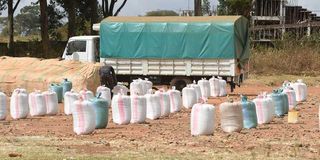Keep your Sh4k!: Why maize farmers are shunning NCPB for private millers

Sacks of dry maize outside Kipchoge Keino Stadium in Eldoret town, Uasin Gishu County on January 23, 2023.
The National Cereals and Produce Board (NCPB) is faced with challenges buying maize from farmers after most of them opted to sell the crop the crop to private millers and traders who offer better prices and make prompt payments.
There are fears that the NCPB might not reach its target of buying a million bags of maize despite the bumper harvest of 44 million bags up from 32 million bags of the crop this season following the distribution of state-subsidised fertiliser and the plentiful short-term crops as a result of the El Nino rainfall phenomenon.
Whereas the board is offering Sh4,000 per 90 kg bag and making prompt payment, millers are offering a higher Sh4,200, buying maize at farmgate level in cut-throat competition occasioned by anticipated shortage in the market.
The farmers, too, have decried stringent conditions set by the board on moisture content of 13.5%, as well as broken and coloration requirements that have driven most of them to prefer millers and other private traders.
“The maize being purchased by the board is for human consumption and must therefore strictly meet all the required quality parameters by the board for dry maize and in line with the East African standards,” said the board management in a statement to branch managers.
“The delivery by farmers has been low but we expect more maize after the festive season,” said Titus Maiyo, Corporate affairs and communications manager.
The board has bought only 100,000 bags of maize in the North Rift in the past month as most farmers are reserving their harvest to ride out impending shortages.
“We urge farmers to take advantage of our prompt payment to deliver their yield to our buying centres countrywide,” added Mr Maiyo.
Better prices
Kenya Farmers Association director Kipkorir Menjo said that since there were no imports, prices are likely to rise to the advantage of the farmers.
“Though the NCPB opened its stores for the past one month, only a handful of farmers have delivered their produce. Millers are offering better prices,” Mr Menjo said.
Millers have opened buying centres in Eldoret and are offering Sh3,900 to Sh4,200 per 90kg bag.
They make payments on delivery while others purchase the produce at farm gate level in a rush to stockpile due to impending shortage of the commodity.
“The attractive prices offered by millers and other traders is a relief for farmers who need the money for personal needs including school fees as well as investing in the next crop,” said Jackson Too from Moiben.
Maize prices have already dropped from Sh6,200 to between Sh3,900 and Sh4,200 as farmers release their produce into the market with the NCPB expected to buy one million bags of maize at Sh4,000 per a 90kg bag.
Trans Nzoia County realised an estimated 5.3 million bags of maize yet it consumes about 2 million bags. This saw an estimated 3.3 million for release into the market.
“We have sufficient maize stocks following a bumper harvest this season and measures have been put in place to minimise post-harvest losses,” said Phanice Khatundi, CEC in charge of agriculture.
She decried exploitation of farmers by middlemen who have flocked the area to purchase the produce at throwaway prices amid fears of import of GMO maize.
“Some of the farmers are still harvesting the crop and there is need to protect them from exploitation from middlemen,” said Ms Khatundi.
4.5 million bags
Uasin Gishu County is projected to harvest about 4.5 million bags of maize this season, out of which more than 2.5 million bags will be released to the market.
The government distributed over three million bags of low-cost fertiliser under the fertilizer subsidy initiative during planting to increase productivity.
An estimated 1.72 million bags of planting fertiliser and 1.3 million bags of top dressing fertiliser were at June redeemed by farmers in the maize, potatoes, coffee, horticulture and sugar cane growing zones.
The country requires about 650,000 tonnes of fertiliser annually and the government has introduced a raft of measures to ensure inputs were available at affordable rates to farmers.
President William Ruto has announced reduction of subsidised fertiliser prices from Sh3,500 to Sh2,500 per 50 kg bags for the short rains, targeting to distribute 2 million bags.
He also halted issuance of new permits to import cereals and noted that his administration will only rescind the decision in the event the country experiences a shortage.
“No permits will be issued to millers to import wheat or maize. This is meant to protect our farmers against price fluctuation in the market,” said Dr Ruto.
According to the Kenya National Bureau of Statistics, Kenya has imported an average of 295,092 tonnes of maize annually over the past five years.
The country’s annual maize requirement stands at 52 million bags to cater for human consumption, manufacture of livestock feeds, seed multiplication and manufacture of other products.





